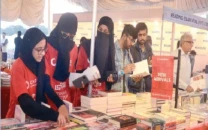Human trafficking victim recounts tales of terror
Sadiq Hussain talks about surviving terrors and being whisked off to Iran illegally.

Jahanian is a small town near Khanewal, in Punjab. Sadiq Hussain, an employed man in his 40s, lives there with his wife and family. Narrating his story, he said that it all began with the acquaintance of two women, Rukhsana and Basheeran. They befriended his family, and led him to dream about employment abroad and of contacting an agent who would help him find work in a foreign country.
The agent was Khadim Hussain from Sialkot. In return for Rs200,000, he promised to send Sadiq abroad. Sadiq managed to raise Rs100,000 and was told to come to Karachi. In Karachi he realised that he will be sent abroad illegally, but agreed after falling prey to the lure of finding lucrative employment.
Sadiq was taken to Gwadar and from there to Iran. In Iran, Saqiq was made to live in a jungle where a large camp had been set up, with several hundred people living there. Presumably, they had also been brought there by human traffickers. Rukhsana and her son Khurram went along with Sadiq and kept pestering him about handing them over the remaining Rs100,000. Sadiq received death threats and was beaten up and was told to contact his family and ask them to arrange the remaining amount.
Using a land line telephone, Sadiq contacted his family for the money. When he learnt that his family was unable to raise the required amount, Sadiq decided to make a run for it. After remaining at the settlement for two weeks, he slipped away under the cover of darkness. He pretended as if he were going to relieve himself.
After walking for hours, he met people who told him that he was in Jask, Iran.
Sadiq still had had Rs5000 on him, which he had managed to conceal from his so-called benefactors. An Iranian national also provided him with some money, besides providing him a transport. Sadiq managed to cross the border and return home about a month after he had left.
Right after he returned, he became very ill. He did not contact the police partly because he feared for his life and partly because he did not trust them in any way. He said that he kept getting threatening calls from the human trafficking gang which had taken him illegally to Iran.
People often contact dubious elements to go abroad for employment. Most of these people are covertly working for human trafficking gangs and the adventure cost most people their lives and money.
There are other ways that people fall victims to these gangs: They may not have been sent abroad illegally, but the little money they had, they gave to people like Khadim in the hopes of getting employment in a foreign country themselves.
Abdul Rehman of Jahanian has given Rs60,000 to these people. Hanifia Bibi told of her son Sharafat Ali who has given Rs10,000 and a one-tola gold ring to Khadim to help him go aboard.
Abdul Hai, the provincial co-ordinator of the HRCP, said: “Human trafficking is an old problem. People are taken to Gwadar and from there onwards to Iran and Turkey. To curb this menace, rules have been changed over the years, but they are of no use without enforcement. Unemployment is the main factor aggravating the problem. It creates opportunities for these unscrupulous elements who exploit simple people. All departments are corrupt. Border forces are involved. Everyone knows everything but there is so much corruption and so little interest in (saving) human lives that nothing is being done to stop this. It is a huge business”.
Published in The Express Tribune, October 25th, 2010.



















COMMENTS
Comments are moderated and generally will be posted if they are on-topic and not abusive.
For more information, please see our Comments FAQ